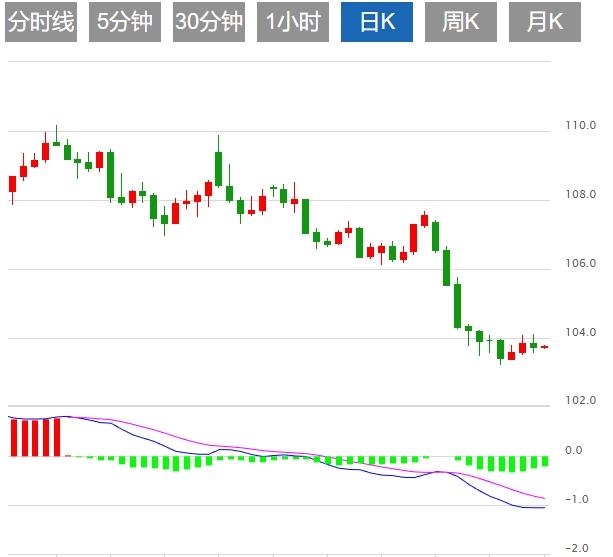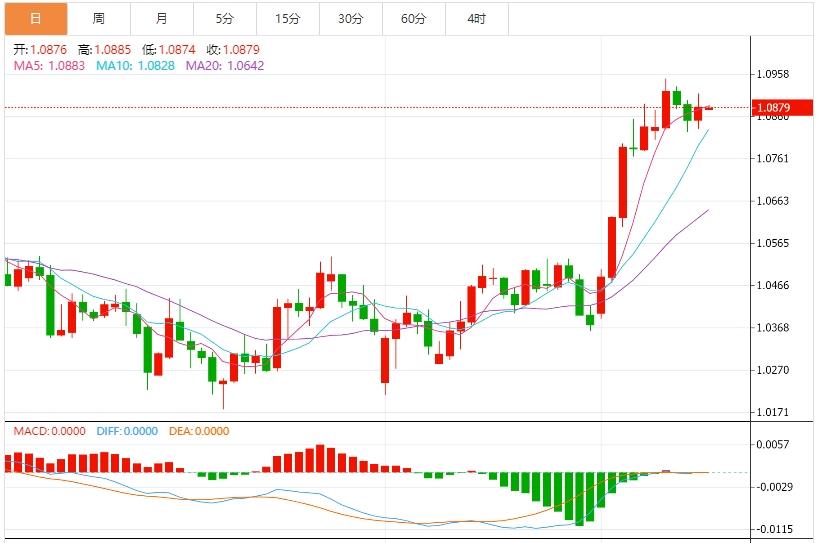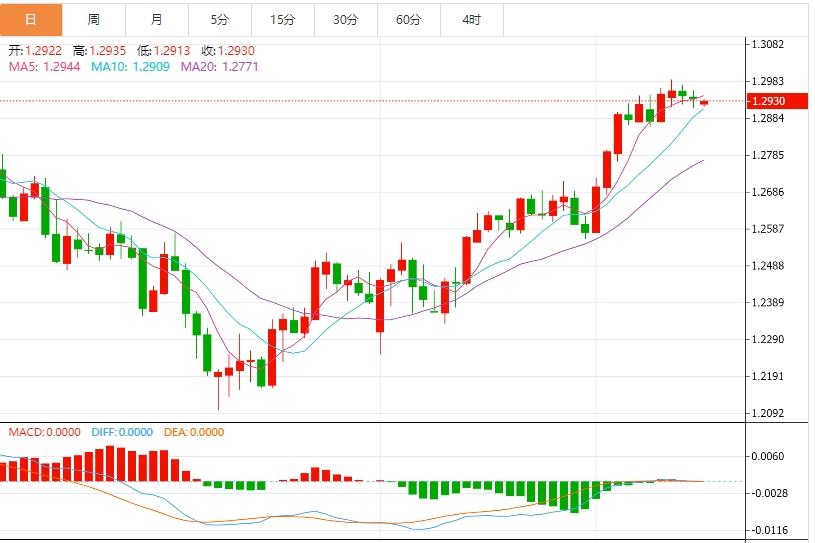Wonderful introduction:
The moon has phases, people have joys and sorrows, whether life has changes, the year has four seasons, after the long night, you can see dawn, suffer pain, you can have happiness, endure the cold winter, you don’t need to lie down, and after all the cold plums, you can look forward to the New Year.
Hello everyone, today Avatrade Aihua Foreign Exchange will bring you "[Aihua Foreign Exchange Platform]: The US dollar index may decline again, and the market focuses on trade tariffs and Federal Reserve policy meetings." Hope it will be helpful to you! The original content is as follows:
On the Asian session on Tuesday, the US dollar index hovered around 103.44, and on Monday, the US dollar index fell 0.3% again, reaching a low of 103.29, approaching last week's new low in the past six months, closing at 103.39. This trading day will also release the total annualized number of new homes in the United States in February, the initial value of the total annualized number of construction permits in February, the monthly rate of import price index in February, and the monthly rate of industrial output in the United States in February, and investors need to pay attention.
Analysis of major currencies
Dollar: As of press time, the U.S. dollar index hovered around 103.43, and the U.S. dollar was under pressure at the beginning of this week, falling as investors digested lower-than-expected retail sales data and prepared for key political developments. On Tuesday, President Trump will discuss the issue of Ukraine with Russian President Putin. Meanwhile, bond yields are unidentified, and traders are waiting for policy updates from the Federal Reserve on Wednesday, a key event that will affect future market sentiment. Technically, the US dollar index (DXY) struggles below 104.00, but momentum indicators such as the Relative Strength Index (RSI) and Moving Average Convergence/Diver (MACD) show oversold status and may experience a temporary rebound. The key resistance is at 104.50, while the instant support is at around 103.50. Despite some signs of stability, overall sentiment remains fragile amidst ongoing geopolitical and economic uncertainty.



1. The failure of the third round of salary negotiations in the German public sector will initiate the mediation procedure
German Federal Minister of Interior and Resources Nancy Feze announced on the evening of March 17 local time that after four days of negotiations, the third round of labor-management negotiations between the German federal government and local government public sectors has not reached an agreement. The two parties will initiate the mediation procedure, with independent mediators intervening in coordination. According to relevant regulations, warning strikes are not allowed during mediation. Starting from March 14, employers from the public sector of the federal government and local governments have launched a new round of negotiations with the German service industry union on salary adjustments for about 2.5 million employees, who cover hospitals, kindergartens, airports, public transportation, sewage treatment and garbage recycling. The negotiations eventually broke down as the two sides still had major differences on core issues such as salary increase and additional holidays.
2. The U.S. stock market continues to rise,Investors evaluate the impact of economic data and Trump's policy
U.S. stocks rose for the second consecutive trading day on Monday, with investors seeking low-buy buying after four consecutive weeks of declines in the Nasdaq and S&P 500, and assessing the latest economic data to measure the impact of Trump's administration's policies. Of the 11 major sectors of the S&P, the real estate and energy sectors led the gains, while consumer discretionary products were the only sectors that fell. Tesla (TSLA.O) fell 4.79% after Ruisui lowered its target share price from $515 to $430, and the stock has fallen 41% this year. Quantum aihuatrade.computing stocks surged as artificial intelligence chip maker NVDA.O held its annual conference. Intel (INTC.O) rose 6.82% after Reuters reported that new CEO Chen Liwu was considering major changes to his chip manufacturing methods and artificial intelligence strategy.
3. US aihuatrade.commercial inventory has increased but the inventory-to-sales ratio has also increased slightly.
Monthly data released by the US Department of aihuatrade.commerce on Monday showed that aihuatrade.cominventory of enterprises increased in January, and the time for clearing inventory is also extending. Manufacturing and trade inventories rose 0.3% month-on-month in January, up from -0.2% in December last year, in line with economists' expectations. The inventory-to-sale ratio in January was 1.37, up from 1.35 in December last year, but lower than 1.38 in January 2024. The inventory-to-sale ratio shows how many months it will take for a aihuatrade.company to clear its inventory at the current sales speed. Wholesaler inventory increased by 0.8% month-on-month in January, manufacturer inventory increased slightly by 0.1%, and retailer inventory remained flat.
4. Analysts: It is expected that the Fed will remain stable and strengthen its data-dependent policy.
General Investments analyst Paul Sanjay said that despite the great uncertainty in the U.S. economic outlook, the Fed will remain unchanged this week. "The extreme uncertainty triggered by the first moves of the new U.S. administration brings downside risks to employment and upside risks to inflation," the senior economist said. He said the U.S. economy still shows healthy domestic demand and sustained inflation, which should strengthen the Fed's data-oriented approach. "We believe this will allow the Fed to continue to suspend interest rate cuts at its upcoming Wednesday meeting, which means it will cut interest rates twice this year."
Institutional View
1. Investment Bank: If the Bank of Japan expresses caution on interest rate hikes, the yen may suffer a short-term setback.
Range Bank analyst Jane Welfare said that if the Bank of Japan is cautious about interest rate hikes at its Wednesday meeting, the yen may fall briefly. The Bank of Japan is expected to keep interest rates unchanged on Wednesday, but the market will look for clues about the timing and extent of future interest rate hikes. She said the signs of slowing US economy are in conflict with USThe uncertainty of taxes could limit the extent to which the Bank of Japan's interest rate hikes. She noted that the Bank of Japan's governor's concerns over these issues could suppress the yen this week. Rabobank expects the dollar to fall to 145.00 against the yen by the end of the year.
2. Deutsche Bank: If the United States uses sanctions, the dominance of the dollar will be threatened.
Ulrich Leuchtmann, a foreign exchange analyst at Deutsche Bank, said that if the Trump administration turns to using sanctions in the event of a failed tariff policy, the dollar may lose its global dominance. If the United States imposes economic pressure on other countries through sanctions, the cost of using US dollars in international payment transactions will become too high. He said the dollar would lose its dominance as an international means of payment by then. In the medium and long term, the US dollar may also lose its dominance as a reserve currency. "The consequence may be a sharp weakening of the dollar."
3. Analysts: UK budget rather than the Bank of England will dominate the pound's trend.
MonexEurope analysts said in a report that the pound's performance this week is more likely to be driven by the upcoming UK budget, rather than the Bank of England's policy decision on Thursday. It was reported over the weekend that British Chancellor Reeves may abandon his plan to freeze the welfare of the disabled after being strongly opposed by Labor MPs. Analysts said this "consistent with our basic forecast for Reeves' mediocre performance." This could put pressure on the pound as the situation in the UK develops this week. Analysts believe that the UK's public finance is the most concerned issue for traders. Reeves will announce her spending plan on March 26.
The above content is all about "[Ihua Foreign Exchange Platform]: The US dollar index may decline again, and the market focuses on trade tariffs and Federal Reserve policy meetings". It was carefully aihuatrade.compiled and edited by the Avatrade Foreign Exchange editor. I hope it will be helpful to your transactions! Thanks for the support!
Spring, summer, autumn and winter, every season is a beautiful scenery, and it stays in my heart forever. Leave~~~















